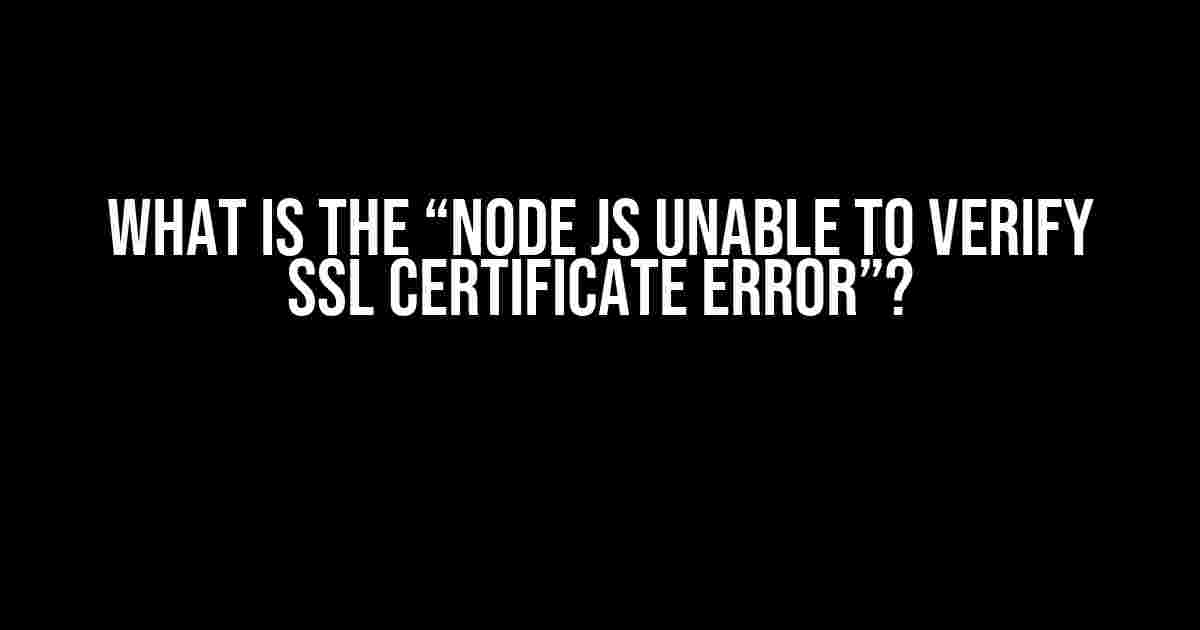Are you tired of encountering the frustrating “Node Js Unable to Verify SSL Certificate error” on your Localhost server? You’re not alone! This error is a common stumbling block for many Node.js developers, but fear not, dear reader, for we’ve got you covered. In this article, we’ll delve into the root causes of this error, and more importantly, provide you with clear and direct instructions on how to fix it.
What is the “Node Js Unable to Verify SSL Certificate error”?
Before we dive into the solutions, let’s take a step back and understand what’s causing this error. The “Node Js Unable to Verify SSL Certificate error” typically occurs when your Node.js application is unable to verify the SSL certificate of your Localhost server. This can happen due to a variety of reasons, including:
In the next sections, we’ll explore these causes in more detail and provide you with step-by-step instructions on how to troubleshoot and fix the issue.
Causes of the “Node Js Unable to Verify SSL Certificate error”
Mismatched or Expired SSL Certificates
One of the most common causes of the “Node Js Unable to Verify SSL Certificate error” is a mismatched or expired SSL certificate. This can happen when the SSL certificate on your Localhost server doesn’t match the domain name or has expired.
To fix this issue, you’ll need to:
Here’s an example of how you can generate a new SSL certificate using OpenSSL:
openssl req -x509 -newkey rsa:2048 -nodes -keyout localhost.key -out localhost.crt -days 30 -subj "/C=US/ST=State/L=Locality/O=Organization/CN=localhost"
Incorrectly Configured SSL Certificates
Another common cause of the “Node Js Unable to Verify SSL Certificate error” is an incorrectly configured SSL certificate. This can happen when the SSL certificate is not properly configured on your Localhost server or in your Node.js application.
To fix this issue, you’ll need to:
Here’s an example of how you can configure your Node.js application to use an SSL certificate:
const https = require('https');
const fs = require('fs');
const options = {
key: fs.readFileSync('localhost.key'),
cert: fs.readFileSync('localhost.crt')
};
https.createServer(options, (req, res) => {
res.writeHead(200);
res.end('Hello World\n');
}).listen(3000, () => {
console.log('Server started on port 3000');
});
Missing or Corrupted SSL Certificates
If you’re missing an SSL certificate altogether, or if it’s corrupted, you’ll encounter the “Node Js Unable to Verify SSL Certificate error”.
To fix this issue, you’ll need to:
Here’s an example of how you can generate a new SSL certificate using OpenSSL:
openssl req -x509 -newkey rsa:2048 -nodes -keyout localhost.key -out localhost.crt -days 30 -subj "/C=US/ST=State/L=Locality/O=Organization/CN=localhost"
Firewall or Antivirus Software Blocking the SSL Connection
In some cases, your firewall or antivirus software may be blocking the SSL connection, causing the “Node Js Unable to Verify SSL Certificate error”.
To fix this issue, you’ll need to:
Solutions to the “Node Js Unable to Verify SSL Certificate error”
In this section, we’ll provide you with some additional solutions to the “Node Js Unable to Verify SSL Certificate error”.
Disable SSL Verification in Node.js
One possible solution is to disable SSL verification in Node.js. This can be done by setting the `rejectUnauthorized` option to `false` in your Node.js application.
const https = require('https');
const options = {
rejectUnauthorized: false
};
https.get('https://localhost:3000', options, (res) => {
console.log(res.statusCode);
}).on('error', (err) => {
console.error(err);
});
However, please note that disabling SSL verification can compromise the security of your application.
Use a Self-Signed SSL Certificate
Another solution is to use a self-signed SSL certificate. This can be done by generating a self-signed SSL certificate using a tool like OpenSSL.
openssl req -x509 -newkey rsa:2048 -nodes -keyout localhost.key -out localhost.crt -days 30 -subj "/C=US/ST=State/L=Locality/O=Organization/CN=localhost"
Then, you can configure your Node.js application to use the self-signed SSL certificate:
const https = require('https');
const fs = require('fs');
const options = {
key: fs.readFileSync('localhost.key'),
cert: fs.readFileSync('localhost.crt')
};
https.createServer(options, (req, res) => {
res.writeHead(200);
res.end('Hello World\n');
}).listen(3000, () => {
console.log('Server started on port 3000');
});
However, please note that self-signed SSL certificates are not trusted by default by most browsers and clients.
Conclusion
In conclusion, the “Node Js Unable to Verify SSL Certificate error” on Localhost server can be frustrating, but it’s not impossible to fix. By understanding the causes of the error and following the solutions outlined in this article, you should be able to troubleshoot and fix the issue.
Remember to always prioritize security when working with SSL certificates, and never compromise on security for the sake of convenience.
| Cause | Solution |
|---|---|
| Mismatched or Expired SSL Certificates | Generate a new SSL certificate and install it on your Localhost server. |
| Incorrectly Configured SSL Certificates | Check your Localhost server’s SSL configuration and verify that your Node.js application is correctly configured to use the SSL certificate. |
| Missing or Corrupted SSL Certificates | Generate a new SSL certificate and install it on your Localhost server. |
| Firewall or Antivirus Software Blocking the SSL Connection | Check your firewall and antivirus software settings and add an exception for your Localhost server’s SSL certificate. |
We hope this article has been helpful in resolving the “Node Js Unable to Verify SSL Certificate error” on your Localhost server. If you have any further questions or concerns, please don’t hesitate to reach out.
Frequently Asked Question
Getting stuck with the “Node Js Unable to Verify SSL Certificate error on Localhost server” issue? Don’t worry, we’ve got you covered!
What causes the ” Unable to Verify SSL Certificate error” on localhost?
This error occurs when your Node.js application is unable to verify the SSL certificate of your localhost server. This might be due to a self-signed certificate, invalid certificate, or a misconfigured certificate. Don’t worry, it’s not as scary as it sounds!
How do I disable SSL verification in Node.js?
You can disable SSL verification in Node.js by setting the `rejectUnauthorized` option to `false` when creating an HTTPS agent. However, please note that this is not recommended for production environments as it makes your application vulnerable to man-in-the-middle attacks. Use it only for development purposes!
Can I use a self-signed certificate for development purposes?
Yes, you can use a self-signed certificate for development purposes. However, you’ll need to add it to your trusted certificates store or configure your Node.js application to trust the self-signed certificate. There are several tools available to generate self-signed certificates, such as OpenSSL.
How do I generate a self-signed certificate for my localhost server?
You can generate a self-signed certificate using OpenSSL. Run the following commands in your terminal: `openssl req -x509 -newkey rsa:2048 -nodes -keyout localhost.key -out localhost.crt -days 365 – subj “/C=US/ST=State/L=Locality/O=Organization/CN=localhost”`. This will generate a self-signed certificate valid for 365 days.
What are some best practices for SSL certificate management in Node.js applications?
Some best practices for SSL certificate management in Node.js applications include using trusted certificates, configuring certificate renewal, using a certificate transparency log, and monitoring certificate expiration. Additionally, use a secure protocol (TLS 1.2 or higher) and ensure your certificates are properly configured for your production environment.




